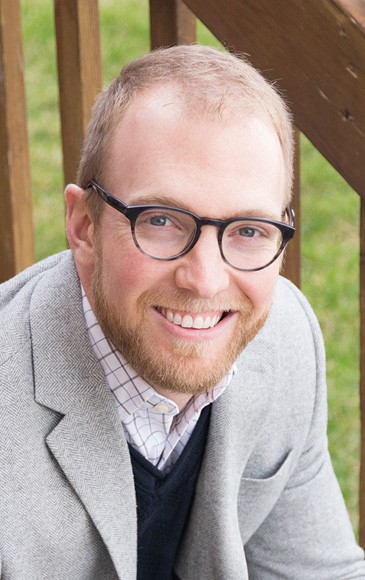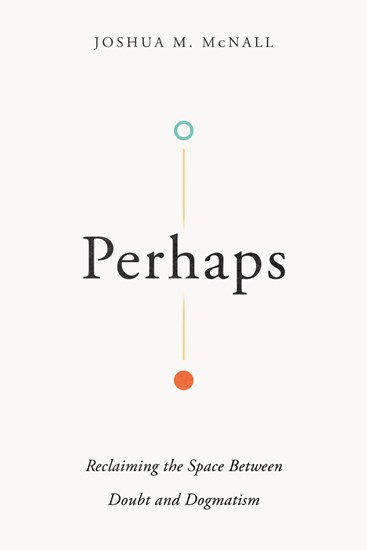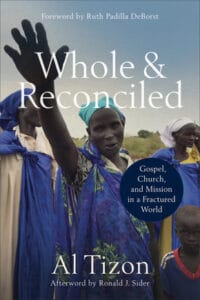 We spoke with Dr. Joshua McNall—associate professor of pastoral theology, ambassador of church relations, and director of the honors program at Oklahoma Wesleyan University—about his latest book, Perhaps: Reclaiming the Space Between Doubt and Dogmatism, published by InterVarsity Press.
We spoke with Dr. Joshua McNall—associate professor of pastoral theology, ambassador of church relations, and director of the honors program at Oklahoma Wesleyan University—about his latest book, Perhaps: Reclaiming the Space Between Doubt and Dogmatism, published by InterVarsity Press.
Few in the Christian arena, specifically evangelical circles, are unaware of the many divisions that exist across denominations. churches, and broader belief structures like politics. health, economics, and the like. In your book, you write about two extremes: the land of unchecked doubt and the land of strident dogmatism. How did we get so fractured and divided, believing we are always right?
Good question. I suppose “sin” is the concise answer. But more specifically, I argue that secular doubt and religious dogmatism are in a kind of codependent relationship. They are mutually repelling continents that serve to push people on both sides to the fringes—while many of us feel caught in the yawning chasm in between.
How we got here is complex, but fear is an important part of it. In some cases, the unspoken worry that we may not be right actually drives a dogmatic posture. We become like the proverbial preacher who wrote in the margin of the sermon manuscript, “Point is weak; yell louder!”
But in other cases, the divide between doubt and dogmatism comes from a confusion over what the Christian life is all about. We have confused faith with certainty. And in that way both doubt and dogmatism share a common, broken core: Both sides bow before the altar of proof and make their sacrifices.
In the book, you write about “knowing darkly.” Tell us what this means and why it’s important.
That phrase comes from the old KJV translation of 1 Corinthians 13:12. Paul says that we see things now “through a glass, darkly.”
Acknowledgment of that imperfect knowing is important; first, because it is biblical and true; but also because it guards against the two extremes mentioned previously: (1) an overconfident dogmatism that falsely claims certitude, or (2) a crippling form of doubt that assumes the only option alongside certainty is unbelief.
Knowing darkly is a humble, patient way of knowing that comes by the Holy Spirit, and often through trials.
Why is it so difficult for us to admit that we are wrong or to open our hearts to learning from others?
Repentance is always difficult. But Scripture speaks of repentance, literally, as a “change of mind” (metanoia). In that sense, the church is the community for which a willingness to change one’s perspective (sometimes repeatedly) is actually a requirement. Unfortunately, we often forget that fact. Admitting that I am wrong is hard because I like to tether my identity to being “right”—which is another way of saying that I want to be my own god. The gospel frees us of that burden.
Why is it vitally important for us to find the “perhaps” in issues related to justice like race, economics, gender, and such?
“Perhaps” is always a prerequisite for changing one’s perspective. And those issues in particular present challenges for open-mindedness. They’ve been politicized. And we are living through a moment in which political commitments run deeper than theological ones—especially in evangelicalism.
To say “perhaps” as I use it is not to adopt a wishy-washy noncommitalism. Rather, it is to engage the imagination to consider what I call non-contrastive solutions.
What is one thing each of us can do today to have a more open posture towards those who think differently than we do?
(1) Put down the phone; (2) turn off the news; and (3) genuinely listen. Listen to your neighbor, yes, but also listen to voices from other centuries and continents—from Scripture, tradition, and great works of art—since these have the power to break us out of our silos and out of the tyranny of the 24-hour news cycle.
Excerpt from Perhaps: Reclaiming the Space Between Doubt and Dogmatism
 “Farewell, Pangaea”
“Farewell, Pangaea”
According to those strange creatures called geologists, all of Earth’s continents were once united as a single landmass: Pangaea. But over time, they drifted. In the oft-quoted words of the poet: “Things fall apart; the centre cannot hold.” In some cases this incremental sliding of tectonic plates brought new unions for the torn-asunder landforms. There were “remarriages,” as when the Indian subcontinent sidled up to what is now called Asia. The two became one. Their bond birthed the mighty Himalayas, now home to the world’s highest peaks, still inching upwards.
But in most cases, the drift put added distance between landforms. And the separation is ongoing. At present, North America and Europe continue to retreat from one another across the Mid-Atlantic Ridge at a rate of approximately one inch per year. Despite the evidence for this division, I have never once felt it. It is possible for the ground to move beneath your feet without you ever noticing. The Mid-Atlantic Ridge is hidden under several thousand feet of water, and the only portion that is not submerged bisects the tiny country of Iceland at the Reykjanes Ridge. I have never been there. Hence, the physical scar of continental fragmentation continues to escape my view.
More visible is the fragmentation in our human tribes. For we too have our fault lines. This book details one such split within the fractured family known as “evangelical.” Specifically, it notes the common move toward one of two extremes:
- The land of unchecked DOUBT, and
- The land of strident DOGMATISM.
My claim is that neither of these alluring postures best characterizes a Christian attitude toward the vexing questions of the faith. And my goal is to set forth a third space by which to reclaim the sacred ground between certainty and skepticism. I call this middle ground perhaps. And in this way, the book is about retrieving a form of sacred speculation.
To many theologians, my task will sound quite strange. After all, to refer to one’s theology as “speculative” is rarely (if ever) a compliment. At conferences and in book reviews for academic journals, the label is invariably a kind of putdown. Take, for example, the claim of Scott R. Swain in a recent work on theological method: “We should be ‘anti-speculative’ in our theology,” he writes. For to be otherwise “closely approximates the vice of ‘curiosity.’” Speculative theology is contemplation cast into its “vicious mode.” Swain takes this colorful phrase from the late John Webster, who had himself borrowed it from Augustine. From this vantage point, curiosity is a vain, wicked, prideful, and idolatrous defect that stretches beyond divine revelation in a hankering to know as only God knows. Translation: It’s bad. And many others concur.
Friedrich Schleiermacher (1768–1834), for all his theological revisions, wanted “nothing to do with any concept of God reached by way of speculation” since to do so would allow philosophical reasoning to usurp the feeling of absolute dependence. Schleiermacher vowed that if he were to find a single speculative proposition in his monumental work, The Christian Faith, he would “strike it out.” Karl Barth (1886–1968), while leveling the charge of speculation against Schleiermacher, agreed entirely with its vicious nature. Barth defined speculation as a kind of natural theology that proceeds from some other basis than God’s concrete revelation in Christ. Finally, Kevin Vanhoozer says flatly that “Christian dogmatics is not a speculative discourse that begins from or limits itself by means of an abstract concept of infinity. It is rather a response to a prior divine communicative initiative.”
Virtually everyone agrees that speculation is a very naughty thing, even if we now have several different definitions for what it is:
- Indulging the idolatrous “vice” of prideful curiosity (Webster and Swain)
- Replacing the feeling of absolute dependence with philosophical reasoning (Schleiermacher)
- Usurping God’s concrete revelation in Christ with natural theology (Barth)
- Starting from an abstract concept of infinity rather than the prior divine Word (Vanhoozer)
Not every one of these ideas is mutually exclusive, and I agree with several of their points. Still, I confess that curiosity and speculation seem to have joined a host of other theological terms that are sometimes hurled more as weapons than as clear and useful descriptors.
So at the risk of taking a “vicious” and unpopular position, allow me to quote the wizard Dumbledore against the Christian theologians: “Curiosity is not a sin. . . . But we should exercise caution with our curiosity.” My book defends a form of speculation in theology and in the Christian life, albeit with some important cautions. All elements of Christian doctrine require a certain stretching forth into the “dazzling darkness” that lies beyond our view—if only to encounter Light. So while this kind of speculation is not always a virtue, neither is it automatically a vice. The proof is in the pudding and the praxis. I argue that a certain form of “faith seeking imagination” is essential, especially in a climate of polarization and partisan infighting. Both evangelicals and their opponents need to relearn the word perhaps.
Taken from Perhaps: Reclaiming the Space Between Doubt and Dogmatism by Joshua M. McNall. Copyright © 2021 by Joshua M. McNall. Published by InterVarsity Press, Downers Grove, IL.


